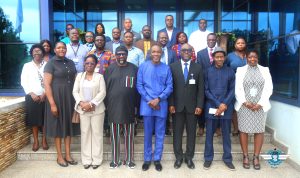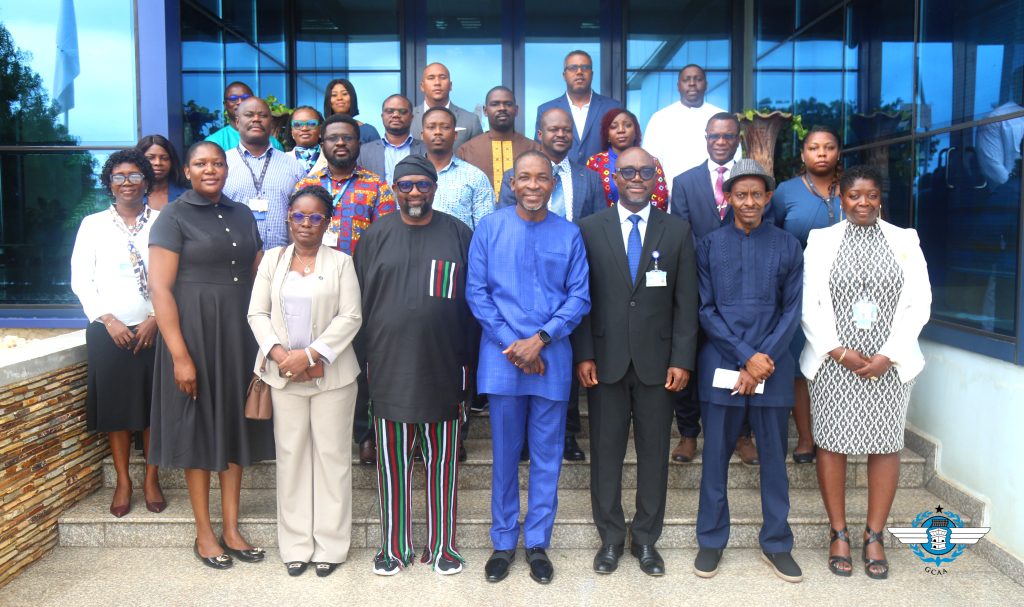
The Ghana Civil Aviation Training Academy (GATA) is hosting a five-day intensive On-the-Job Training Instructor (OJTI) course organised by the Banjul Accord Group Aviation Safety Oversight Organisation (BAGASOO).
The programme commenced on Monday, 25 August 2025, with an opening address by the Acting Director-General of the Ghana Civil Aviation Authority (GCAA), Rev. Stephen Wilfred Arthur.
Speaking on behalf of management and staff, Rev. Arthur warmly welcomed the participants and emphasised the critical importance of training and capacity-building to aviation safety and efficiency.
“The aviation industry, by its very nature, is built on collaboration and the highest standards of professionalism,” he remarked. “Training and capacity-building are essential activities that sustain our industry’s safety, efficiency, and growth.”
Highlighting the significance of the course, Rev. Arthur noted that effective knowledge and skills transfer in operational environments is one of the most critical responsibilities in aviation.
He expressed gratitude that participants were drawn not only from Ghana but also from Cabo Verde and The Gambia, reflecting a strong commitment to cross-border collaboration and knowledge-sharing.

Reaffirming GATA’s vision, Rev. Arthur stated: “The Ghana Civil Aviation Training Academy continues to demonstrate its commitment to providing world-class training and capacity-building, not only for Ghana but for the African region. I hope that one day, we will welcome participants from Singapore, Indonesia, the Americas and beyond—affirming our truly global outlook.”
Rev. Arthur further commended GATA’s team and facilitators for ensuring that the course meets the highest international standards.
He extended appreciation to BAGASOO for its invaluable role in fostering regional cooperation through training initiatives, noting that “BAGASOO courses have become one of the most frequent in this institution,” thus deserving of an award.
Encouraging the participants, Rev. Arthur urged them to commit fully to the course, engage actively, share experiences, and translate the knowledge gained into practice, noting that one of the greatest challenges in Africa is not acquiring knowledge but applying it effectively.
Rev. Arthur expressed confidence that the participants will use the skills acquired to good effect.
Also addressing the gathering, GCAA’s Director of Safety Regulation, Mr. Franklin Gyamera, applauded BAGASOO’s continued efforts in advancing aviation safety training across the region.
He highlighted the dual benefits of such programmes: enriching the knowledge base of participants and qualifying new instructors for GATA.
Mr. Gyamera said that for the instructors, the training is an opportunity to share expertise, and for the participants, to absorb as much as possible.
Additionally, Mr Gyamera noted that the session will serve as an OJT platform for two of GCAA’s prospective instructors, who will soon contribute to GATA’s faculty.
He also acknowledged BAGASOO’s Cooperative Training Scheme, which builds a pool of instructors and contributes to regional capacity development.
In a speech delivered on behalf of BAGASOO’s Executive Director, Jailza Silva, Mr. Jacob Idaewor expressed gratitude to GCAA for hosting the training programme.
The speech emphasised that the training aligns with BAGASOO’s regional objective of strengthening human resource capacity.
Mr Idaewor explained that the OJTI course, once a component of BAGASOO’s Inspector Training System (ITS), was later separated to cater specifically to experienced inspectors tasked with delivering OJT. The course, he said, extends beyond instruction to include planning, organisational setup, management, and continuous evaluation for quality improvement.
He noted that the OJTI is a cornerstone of BAGASOO’s training framework, complementing formal classroom instruction and ensuring that experienced inspectors are well-equipped to mentor and qualify new entrants.
BAGASOO highlighted the importance of its regional training database, which integrates national data and identifies training gaps across member states.
This, the speech explained, allows for efficient resource allocation and strengthens regional self-sufficiency in aviation safety oversight.
The representative of the BAGASOO Executive Director added that the organisation is working to enhance its database in line with global best practices—improving efficiency, scalability, and data harmonisation.
Ultimately, he said BAGASOO’s goal is to build a self-sustaining regional capacity
This is to be done by fostering home-grown instructors and course developers, supported by the Cooperative Training Scheme, through which the organisation is steadily harnessing a wealth of expertise across member states.
BAGASOO also reiterated its appreciation to the GCAA for hosting the training and assured participants of the organisation’s commitment to delivering the programme to the highest professional standards for the benefit of the entire region.
About The Author
You may also like
-
JRANSA & Pacific Consultants Meet GCAA to Collect Aviation Data for JICA’s future cooperation policies
-
GCAA Ends 3-Day Corporate Strategy Review Meeting To Plan Ahead
-
President John Mahama Commissions GCAA’s New Aviation Navigation Centre and Border Security Systems
-
GCAA Wins UG Corporate Football League
-
MR. THEOPHILUS ADONIS ARYEE AGO APPOINTED AG. DEPUTY DIRECTOR-GENERAL (TECHNICAL) OF GCAA
